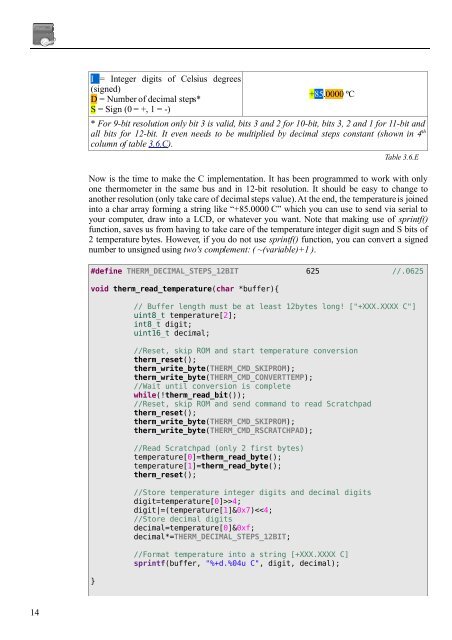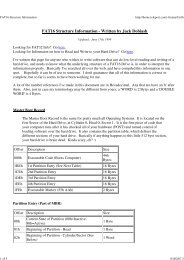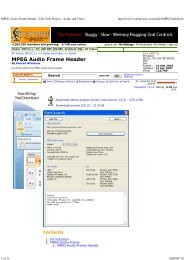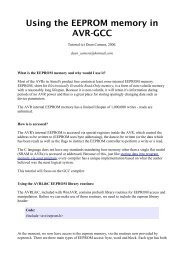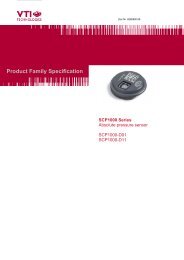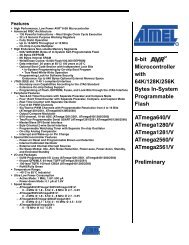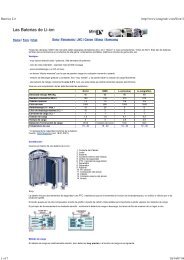Using DS18B20 digital temperature sensor on AVR ... - teslabs
Using DS18B20 digital temperature sensor on AVR ... - teslabs
Using DS18B20 digital temperature sensor on AVR ... - teslabs
You also want an ePaper? Increase the reach of your titles
YUMPU automatically turns print PDFs into web optimized ePapers that Google loves.
I = Integer digits of Celsius degrees<br />
(signed)<br />
D = Number of decimal steps*<br />
S = Sign (0 = +, 1 = -)<br />
+85.0000 ºC<br />
* For 9-bit resoluti<strong>on</strong> <strong>on</strong>ly bit 3 is valid, bits 3 and 2 for 10-bit, bits 3, 2 and 1 for 11-bit and<br />
all bits for 12-bit. It even needs to be multiplied by decimal steps c<strong>on</strong>stant (shown in 4 th<br />
column of table 3.6.C).<br />
Table 3.6.E<br />
Now is the time to make the C implementati<strong>on</strong>. It has been programmed to work with <strong>on</strong>ly<br />
<strong>on</strong>e thermometer in the same bus and in 12-bit resoluti<strong>on</strong>. It should be easy to change to<br />
another resoluti<strong>on</strong> (<strong>on</strong>ly take care of decimal steps value). At the end, the <str<strong>on</strong>g>temperature</str<strong>on</strong>g> is joined<br />
into a char array forming a string like “+85.0000 C” which you can use to send via serial to<br />
your computer, draw into a LCD, or whatever you want. Note that making use of sprintf()<br />
functi<strong>on</strong>, saves us from having to take care of the <str<strong>on</strong>g>temperature</str<strong>on</strong>g> integer digit sugn and S bits of<br />
2 <str<strong>on</strong>g>temperature</str<strong>on</strong>g> bytes. However, if you do not use sprintf() functi<strong>on</strong>, you can c<strong>on</strong>vert a signed<br />
number to unsigned using two's complement: ( ~(variable)+1 ).<br />
#define THERM_DECIMAL_STEPS_12BIT 625 //.0625<br />
void therm_read_<str<strong>on</strong>g>temperature</str<strong>on</strong>g>(char *buffer){<br />
}<br />
// Buffer length must be at least 12bytes l<strong>on</strong>g! ["+XXX.XXXX C"]<br />
uint8_t <str<strong>on</strong>g>temperature</str<strong>on</strong>g>[2];<br />
int8_t digit;<br />
uint16_t decimal;<br />
//Reset, skip ROM and start <str<strong>on</strong>g>temperature</str<strong>on</strong>g> c<strong>on</strong>versi<strong>on</strong><br />
therm_reset();<br />
therm_write_byte(THERM_CMD_SKIPROM);<br />
therm_write_byte(THERM_CMD_CONVERTTEMP);<br />
//Wait until c<strong>on</strong>versi<strong>on</strong> is complete<br />
while(!therm_read_bit());<br />
//Reset, skip ROM and send command to read Scratchpad<br />
therm_reset();<br />
therm_write_byte(THERM_CMD_SKIPROM);<br />
therm_write_byte(THERM_CMD_RSCRATCHPAD);<br />
//Read Scratchpad (<strong>on</strong>ly 2 first bytes)<br />
<str<strong>on</strong>g>temperature</str<strong>on</strong>g>[0]=therm_read_byte();<br />
<str<strong>on</strong>g>temperature</str<strong>on</strong>g>[1]=therm_read_byte();<br />
therm_reset();<br />
//Store <str<strong>on</strong>g>temperature</str<strong>on</strong>g> integer digits and decimal digits<br />
digit=<str<strong>on</strong>g>temperature</str<strong>on</strong>g>[0]>>4;<br />
digit|=(<str<strong>on</strong>g>temperature</str<strong>on</strong>g>[1]&0x7)


